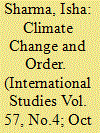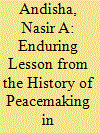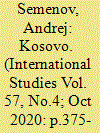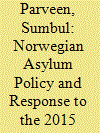| Srl | Item |
| 1 |
ID:
175355


|
|
|
|
|
| Summary/Abstract |
As globalization gained currency in international politics, multilateral negotiations increasingly expanded their scope to include environmental issues. Still, the political dimension of environmental change remains underrepresented in international relations (IR) theorization. This article aims to focus on the theoretical fortification in the mainstream IR when it comes to transboundary environmental threats. Since the threats of climate change and environmental degradation cannot be contained within the sovereign territories of states, the state-centric conception of the political order in the conventional approaches to IR fails to respond to the threats that are planetary in nature. The article seeks to answer two questions: (a) What are the inadequacies in the realist and liberal concepts of political order vis-à-vis climate change? (b) How to destabilize the conventional assumptions of political order with the aim of making it more receptive to the concerns associated with climate change? To do the latter, the article delves into the work of Robert Cox in order to delineate his intersubjective approach, which combines the material basis of political order with social relations of production. By doing so, this approach also sheds light on the transnational variants of hegemonic power, making it a useful explanatory framework for political implications of climate change.
|
|
|
|
|
|
|
|
|
|
|
|
|
|
|
|
| 2 |
ID:
175353


|
|
|
|
|
| Summary/Abstract |
Peace processes offer opportune moments for social and political transformation in embattled nations. There is no perfect formula or peace recipe. As per the existing literature, the ‘ripeness’ of circumstances and timing of a peace process and pertinence of the ‘substance’ of settlements to the root causes of conflict are the main components of a viable peace agreement. In the past 30 years, Afghanistan experienced two unsuccessful peacemaking episodes: first after the Soviet withdrawal in 1989 and the second following the removal of the Taliban in 2001. While failure of the former is primarily attributed to the complexities of circumstance at the time, ineptness of the latter is linked to the primacy of imposed deadlines over inclusive consultations and inadequacy of contents of the Bonn Agreement. By briefly examining substantive characteristics of peacemaking processes in the context of Najibullah’s National Reconciliation Policy and the Bonn process, this article argues that meaningful structural change in favour of an inclusive and participatory political system and institutionalization of a regional balance of interests in foreign relations remain central to enduring peace in Afghanistan.
|
|
|
|
|
|
|
|
|
|
|
|
|
|
|
|
| 3 |
ID:
175356


|
|
|
|
|
| Summary/Abstract |
The present tensions in Belgrade–Pristina relations highlight the relevance of a consensus regarding the question of Kosovo. This article argues that the cyclical nature of Kosovo’s history has been muted by the thesis ‘Kosovo is a unique case’ which through unilateral decisions produced various legal schizophrenias. These legal schizophrenias embodied in a power triangle—Ahtisaari Plan–European Union Rule of Law Mission in Kosovo (EULEX)–Kosovo’s Constitution. Despite gaps and inherited chaos, the indisputable achievements of the EU’s efforts in normalizing relations between Belgrade and Pristina show that the EU not only can facilitate peace but also possesses the capacity to achieve a consensus. Already there is a ‘silent’ consensus among actors on the status of Kosovo—the European protectorate. The article also discusses institutional design based on the consensus, which aims to promote shared narratives.
|
|
|
|
|
|
|
|
|
|
|
|
|
|
|
|
| 4 |
ID:
175357


|
|
|
|
|
| Summary/Abstract |
In recent years, Norway has emerged as an important destination of asylum for refugees. During the refugee crisis of 2015, Norway, with a total population of slightly above 5 million, received more than 31,000 applications for asylum. This was close to the total number of asylum seekers it had received in the last three years. This article discusses Norway’s history as an asylum destination as well as policies for the protection and integration of refugees. It focuses on how the refugee crisis of 2015 unfolded in Norway. The domestic political discourse and the response of civil society organizations are analysed. The article also looks at the changes introduced in the asylum policy and the role of the European Union in determining Norway’s response to the crisis.
|
|
|
|
|
|
|
|
|
|
|
|
|
|
|
|
| 5 |
ID:
175354


|
|
|
|
|
| Summary/Abstract |
The democratic peace hypothesis, which is embedded in the neo-Kantian romance of liberal cosmopolitan idealism, was framed in the spatiotemporal context of the Cold War bipolarity. Michael Doyle, who is one of its proponents, invoked the Kantian philosophical abstraction of ‘the perpetual peace’ by providing an intellectual defence and moral high ground for the values of the Liberal Capitalist world. In the post–Cold War setting, Francis Fukuyama re-casted the hypothesis and portrayed the triumph of liberal international order as ‘the end of history’. He attempted to reframe the democratic peace thesis, not only to celebrate liberal values as the normative exemplar for ordering a post–Cold War international system but also to provide an intellectual defence for the newly emerging space for American leadership in a post-hegemonic international system. This intellectual defence of the ethical supremacy of liberal idealism in the world, shaped by the leadership of the USA, was entrenched in the epistemological Imperialism of the West. Besides, it also reflected an exclusionary idea of the history of international relations that was heavily grounded in the chronology of the post-Westphalia international order. Situating ourselves in this framework, this article is an attempt to critique the epistemic foundations of the democratic peace hypothesis, by deconstructing its assertions in the geostrategic context of the regional security architecture in South Asia. The article criticizes the democratic peace thesis, using an analysis of the Kargil conflict (1999) between India and Pakistan, and by placing ourselves in the epistemological framework of the historical turn in international relations.
|
|
|
|
|
|
|
|
|
|
|
|
|
|
|
|